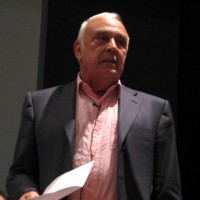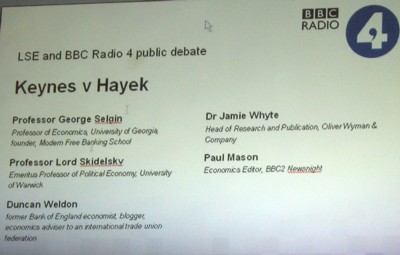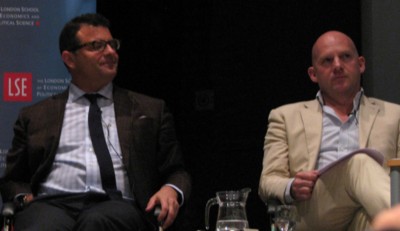I see that, no doubt under the influence of the same editorial prodding as I received this afternoon, Johnathan Pearce has already done a posting here (see below) about the debate last night (also attended by John Phelan) at the London School of Economics. What I have to say is really just an expanded version of what Johnathan Pearce has already said, but I’ll say it anyway, partly because I do have one distinct advantage over him in this matter. Unlike Johnathan but like John Phelan, I was actually there.
I took photos, including one that does quite a bit of further event describing, which saves me having to:
Click to make that more legible.
Here are the two bad guys, Skidelsky and Weldon:


And here are the two guys on our side, Selgin and Whyte:
Click on the good guys to get them bigger. (The bad guys are quite big enough already.) As you can probably deduce from my pictures, the lighting on the stage was what you might call excellent for radio.
As for what was said, my overriding impression was that the Hayekians won, but not in quite the sense that John Phelan means when he says that they won, i.e. (a) that the Hayekians were more numerous and shouted louder and (b) that the Hayekians included John Phelan. They were, they did and they do. The “Hayekians” included me as well, for whatever difference that makes to anything. No, this was a more significant victory for Austrianism in the broader sense than merely that some Keynesians were, in the opinion of one of the anti-Keynesians who attended, out-argued on the radio. The really important point is that Austrianism is being put up there beside the broadly Keynesian macro-economics orthodoxy, as the alternative. The alternative.
I recall in my youth reading a book by someone called Robert Townsend. Townsend was the boss of a car hire company called Avis, and it was on his watch that a go-ahead new advertising agency (a bit like the ones in Mad Men), urged on and applauded by Townsend and his underlings, coined the Avis advertising slogan: “We’re Number Two and We Try Harder”. Number One being the car rental company Hertz.
The point of the slogan wasn’t that it caused very much immediate hurt to Hertz. On the contrary, it acknowledged Hertz as Number One, which got everyone’s attention. Who are these guys calling themselves Number Two? Wow. The regular advertising thing in those days would have been for Number Two to scratch around until it had found some more or less implausible excuse to call itself Number One. Most of the hurts (pardon the pun) unleashed by this slogan were inflicted upon car hire companies Number Three, Four, Five and the rest of them. What the slogan about Avis being Number Two but trying harder did was separate Avis from the huge pack of “other” car hire companies. It turned Avis from nothing into Pepsi-Cola, you might say. Hertz continued to be Coke (whether Coke itself is still Coke is another argument), but Avis itself lept ahead, patronised by anyone who fancied trying a try-harder, less smug alternative to Hertz. The others, who were presumably trying just as hard as Avis, fell away.
That, I believe, is the significance of events like that debate last night. It puts Austrianism on the map as the “other” way of looking at all that financial turmoil we’ve been having lately. No Keynesians present at this debate will have been very discomforted by anything that was said during it. They had their guys up there on the platform and they clapped and laughed and cheered when their guys spoke with any eloquence, just as we (John Phelan, I and the rest of our team in the audience) clapped when our guys waxed eloquent.
For you see, this was a classic BBC event. Built into the DNA of the BBC is that in order to “do” anything that is opinion rather than mere news, you have to argue about it, and to argue about it, you have to have two sides. Not three sides or five sides. Two.
And the big trick, if you aren’t Number One in a BBC debate is somehow to wangle yourself the Number Two spot, and what’s more to get that spot entirely for your team. Austrianism, judging by last night’s show, is well on the way to accomplishing precisely that status. And this despite, as Lord Skidelsky himself quite rightly said, having a numerically tiny academic presence compared to the (approximately speaking) Keynesian orthodoxy.
The big point here is not, e.g., whether Lord Skidelsky said nice things about how the Chinese government goes about its Keynesian business (although he did), or whether Selgin spoke eloquently (he did in my biased opinion, eventually, and despite his rather comical reliance on waving minute and totally illegible graphs around, which don’t exactly go over a storm on the radio, as everyone except him seemed to realise). The point is that this debate was “Keynes v Hayek”, rather than “Keynes and his critics”. The speakers were two Keynesians and two Hayekians, rather than merely two Keynesians and then a pathetic queue of anti-Keynesian pygmies of about ten different varieties (several of them complaining that the Keynesian headliner acts weren’t being Keynesian enough) taking it in turns to be humiliated.
I agree with Phelan that Skidelsky’s open admiration for Chinese “investment” in “infrastructure”, in answer to a question about China from the floor (and huge kudos to whoever it was who asked it), was both an illustration of the inherently bossy nature of Keynesianism, just as Hayek said, and that this might have been seized on more eagerly by Whyte or Selgin than it was, which was hardly at all. Skidelsky’s answer was also a horrendous hostage to fortune. If Chinese infrastructure “investment” in recent years becomes famous for being as wasteful as some here already suspect, Skidelsky should be reminded of this pronouncement.
Speaking very much for myself, I was delighted when Skidelsky spelt out, with admirable clarity, that we Austrianists believe that President Roosevelt prolonged the Great Depression. At this point I shouted out words to effect of “quite right” and “he did”. Skidelsky then said, glancing contemptuously in the general direction of my heckling, that anyone who thought that was living in cloud cuckoo land. Fine. He was on the platform and was entitled to the last word on the matter. On the night.
The point being not to win arguments like this, but to have them, to let everyone listening know that, when it comes to things like whether Roosevelt had a good Great Depression or a bad Great Depression, there is an argument.
When it turns out (this was not really talked about last night) that actually, far from having calmed down, our new version of the Great Depression is still at the you-ain’t-seen-nothin’-yet stage, arguments like that one in particular about Roosevelt making the Great Depression worse, and in general about Keynes versus Hayek, could result in the Number One team in this bunfight being deposed. Guess who I think might – just might – be invited to step forward to replace that Number One team. I agree with Johnathan Pearce that “wallowing in despair” (see below) is, in times like these, a cop-out.
A final point, concerning the BBC master of ceremonies, Paul Mason. Mason had a lot to contend with, what with urging speakers to cool it with the paper flapping, organising the re-recording of bits when microphones fell off or when there was a big noise interrupting things or when the audience wasn’t quiet enough during the first attempt at a re-run, or when he himself had some intros to do but fluffed his lines, for instance by giggling. Also, from time to time, it was Mason’s rather undignified duty to get us all to yell either “Yo Keynes!” or “Yo Hayek!”, according to taste. Nevertheless, in among all that, I got the distinct impression that, if not actually on our side, Paul Mason is highly sympathetic to the case that the Hayek team were making. At the very least, he has taken the time to become thoroughly acquainted with what that case is.
An edited version of all this intellectual mud-slinging will be broadcast by Radio Four on August 3rd.
See also the latest Keynes v Hayek rap video. They played that at the beginning, to get everyone in the mood. Genius. If you want to know why I think it’s genius, you must be one of those people who skips to the end of blog postings without actually reading them. Which is fine, but: see all of the above.






They played that at the beginning, to get everyone in the mood. Genius.
I didn’t come to the debate because I was feeling ill (which I now regret). When I was thinking about whether to come, my though was “I bet they play the rap videos at the start to warm up the audience”, which was an obvious thing to do because they are so well done. Which is great, given that the rap videos (and particularly the second one) are so obviously on our side. (And in fact, watching the videos possibly made the people at LSE feel that they needed to hold the debate).
Yes, Brian, I know that this is the point that you just made. I am just repeating it.
Unfortunately, not being a resident of the UK anymore, it is hard for me to attend such debates, but (like Brian) I am encouraged that the debates are taking place and that this was explicitly Keynes versus Hayek which is the to correctly identify the opposing forces in this argument.
My only real concern is that the prevailing Keynesian orthodoxy will have destroyed the economy before the followers of Hayek get a look in.
Not much point emerging from the rubble afterwards with a Hayekian chancellor if he’s no longer the chancellor of the UK, but something more akin to Ruritania or worse still the Duchy of Grand Fenwick
Despite all of the clamour of the arguments and the apparent win by our team, I remain depressed…
At least this is keeping the Port Erin off license in business.
That alphabet goulash clown Skidelski was in a debate with George Selgin?!
For pity’s sake.
is there anywhere on the internet where you can watch or listen to the debate?
is there anywhere on the internet where you can watch or listen to the debate?
Newsnight has just introduced its story on Ed Milliband’s decision today to back the government’s pay freeze by playing the Keynes v Hayek video from Econstories.tv
The narrator even described it as a “fabulous” video that is “easily the most entertaining explanation of the issues” – as closely as I can remember the wording, anyway.
I realise I’m commenting on a posting that’s six months old, but I’m hoping Brian, as the original author, gets automatically notified of comments. That the video is being used to give context to a now-current news item is certainly consonant with Brian’s original theory about Austrianism as the new #2 (with apologies to The Prisoner).
http://www.youtube.com/watch?v=PLBOKq4On7k